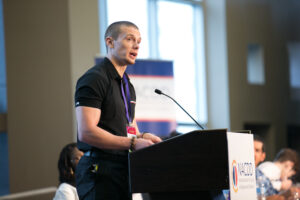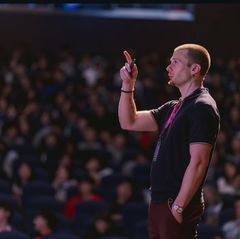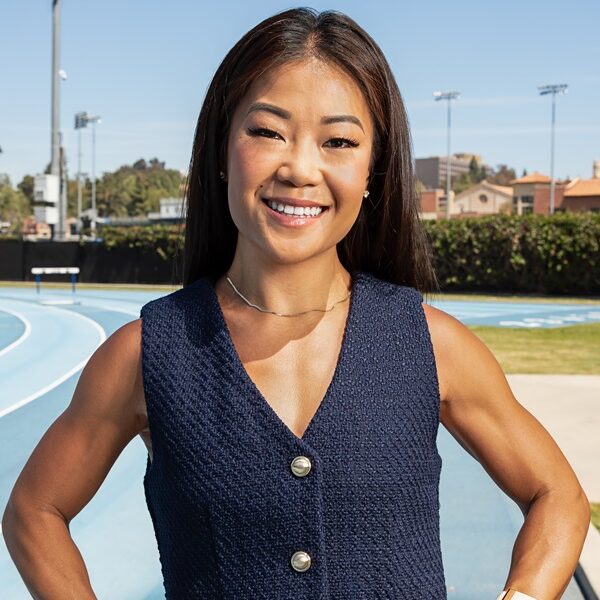By:
View the original article on UCLA Newsroom

Drawing on the solace he finds in poetry, Russell Lehmann calls his life’s journey “the road less traveled.” For Lehmann, the international disability rights advocate at the UCLA Tarjan Center, that road has been a challenging one.
Growing up, Lehmann — who was diagnosed with autism at the age of 12 — grappled with obsessive-compulsive disorder and phobias which led him to drop out of school in the fifth grade, and subsequently, to spend five long weeks in a psychiatric unit in the spring of 2003, where he was first diagnosed.
In January, Lehmann became a Bruin after being invited to participate in a groundbreaking course on autism and neurodiversity within the UCLA Division of Undergraduate Education’s disability studies program, building on his track record as an internationally recognized speaker who spreads awareness about the intersection of disabilities and mental health.
“For me, autism is a disability, but it’s not a flaw,” Lehmann said. “Disabilities are part of the human condition and to be able to share this message at UCLA is really special to me.”
We spoke with Lehmann to learn more about his role in the course, what it means to share his lived experiences as an individual with autism at UCLA and what he’s learned advocating for disability rights around the globe.
What is involved with your role as the international disability rights advocate at UCLA’s Tarjan Center?
I have the privilege to co-facilitate Disability Studies M139: Perspectives on Autism and Neurodiversity, led by Maya Ayoub alongside Yasamin Bolourian. We recently finished our winter quarter course and I want to say it was very impactful for students — and for me as well.
The class reached capacity, our waitlist was full, so it’s evident that there was a lot of interest in the course.
In addition to highlighting the lived experiences of people with autism and disabilities in general, the course does an in-depth compare-and-contrast of the medical model of disability, which tends to see autism as a deficit — something to overcome, fix or manage — versus the social model, which advocates for the self-empowerment of autistic individuals and identifies ways that society can accommodate individuals.
How would you respond to the recent comments about autism made by Health and Human Services Secretary Robert F. Kennedy Jr.?
There is a truth in that there is a high prevalence of unemployment, a large gap in educational attainment and that people with autism might need more help executing everyday things.
But his stinging rhetoric makes it seem as though we’re innately incapable of having relationships with people or with language. Calling autism “a disease” and comparing it to the COVID-19 pandemic also paints our condition as something contagious.
If society could stop placing blame on autistic individuals and instead seek to understand our needs and provide accommodations, I think it would quickly become clear that autism is part of the human experience and that people living with it deserve respect.

What should everyone know about the “Perspectives on Autism and Neurodiversity” course?
The main goal is to reframe people’s attitudes and understanding of what it means to have autism, a disability or to be neurodivergent. Think of it this way: If you go on a hike and you see a strange, unusual flower, it’s easy to call it beautiful.
So I think if you are somebody who wants to challenge your perspective on the world and is interested in finding beauty in the multitude of human expression, this class is for you.
Disability studies is a great major or minor if you want something that’s going to be applicable for your entire career and personal life.
You’ve spoken in interviews about how, because of the lack of accommodations at the public school you attended, you opted to take online courses and ended up withdrawing from the world for almost 20 years. What did that experience teach you?
Because I was withdrawn from the world for nearly two decades, I like to say that autism took from me everything that I ever wanted, but in turn, gave me everything I ever needed.
I grew up having an older sister, so I saw what it meant to her to have friends, to hang out with them on the weekends, to go on dates — all the experiences that help a teenager find themselves and their place in the world. Because I didn’t have support or accommodations, I didn’t get to experience any of that.
But I turned my isolation into productive solitude. I dedicated myself to reading, writing and exercising to a degree that most people my age probably weren’t doing. I really got to know the rich inner world of my mind and in doing so, I realized nobody can ever take away the knowledge I acquire.
So, to this day, I strive to learn all I can about the human condition. It reminds me of a quote I once read that goes: “Those who know how to suffer, suffer less.”
What is your advice for UCLA community members reading this?
I just want people to know — whether they have autism themselves or have a friend or loved one living with it — that those who are different make the difference.
Difference is diversity and diversity is the key to societal change. And if we engage one another with curiosity and compassion and allow ourselves to enter into each other’s worlds, I think we can slowly begin to rewrite society’s view on people with disabilities.
And just think of this: The disability community, which according to the United Nations is about 1 billion people, is considered the largest minority community in the world. And that includes people with autism, people of older age and — even if temporarily — young children who hurt themselves playing sports.
My wish, my hope, is for more people to realize that, at one point or another, we’re all going to be part of the disability community.
What does your work at UCLA mean to you, personally?
I’m very grateful for the position that I have. You know, I’m finally having my college experience!
And I owe a huge thanks to Elizabeth Laugeson, the director of the UCLA Tarjan Center, for taking a chance on me and inviting me to be a part of the UCLA community. It’s very healing and cathartic for me to realize that I am finally, after so many decades, accepted and included.
What have you learned traveling the world to advocate for disability rights?
What fascinates me about disability around the world is how different cultures interpret and perceive it.
I’ve spoken in the Middle East a few times and in the Arab Gulf States — United Arab Emirates, Qatar, Bahrain, Oman — they don’t use the word “disability.” Instead, they use the term “people of determination.”
I think that’s just a beautiful way to put it because it highlights the resilience it takes to constantly overcome systemic barriers.
Here are some resources Russell Lehmann recommends to learn more about autism.
The UCLA Tarjan Center is one of 67 federally designated University Centers for Excellence in Developmental Disabilities, funded by the Administration on Intellectual and Developmental Disabilities. It connects university resources with local, state and international organizations, policymakers, and people with disabilities and their families.
The Arc — I am a national board member of this group that provides advocacy and support for individuals with intellectual and developmental disabilities, including autism.
Autistic Self Advocacy Network — Led by autistic people, for autistic people, this network offers guides, toolkits and policy info.
National Disability Employment Awareness Month: Fact sheet 2024


